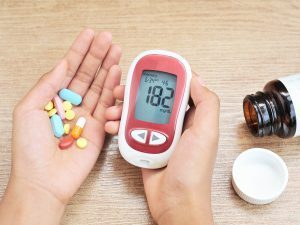- Home
- Editorial
- News
- Practice Guidelines
- Anesthesiology Guidelines
- Cancer Guidelines
- Cardiac Sciences Guidelines
- Critical Care Guidelines
- Dentistry Guidelines
- Dermatology Guidelines
- Diabetes and Endo Guidelines
- Diagnostics Guidelines
- ENT Guidelines
- Featured Practice Guidelines
- Gastroenterology Guidelines
- Geriatrics Guidelines
- Medicine Guidelines
- Nephrology Guidelines
- Neurosciences Guidelines
- Obs and Gynae Guidelines
- Ophthalmology Guidelines
- Orthopaedics Guidelines
- Paediatrics Guidelines
- Psychiatry Guidelines
- Pulmonology Guidelines
- Radiology Guidelines
- Surgery Guidelines
- Urology Guidelines
Pill that offers same benefits as bariatric surgery in diabetes

The scientists have developed an orally administered gut-coating formulation that provides a transient coating of the intestine to prevent nutrient contact with the lining in the proximal bowel and avoid post-meal spikes in blood sugar. This formulation could be a potential treatment for type 2 diabetes. The study was published in the journal Nature Materials.
Bariatric surgery is not only effective in reversing obesity but also reverses type 2 diabetes in patients with both diabetes and obesity. However, the number of patients that pursue the surgery is very low. This prompted the collaboration between the researchers of Tavakkoli and Brigham and Women's Hospital.
Ali Tavakkoli, co-director of the Center for Weight Management and Metabolic Surgery at Brigham and Women's Hospital (BWH), and colleagues to find a less invasive but equally effective treatment for reversing type 2 diabetes, one that can offer the same benefits as surgery but that may have wider appeal and application.
"We envision a pill that a patient can take before a meal that transiently coats the gut to replicate the effects of surgery," said co-senior author Jeff Karp, Ph.D., a bioengineer and principal investigator at BWH. "Over the last several years, we've been working with our surgical colleagues on this idea and have developed a material that meets an important clinical need."
The team members searched for a starting material that would have just the right properties to adhere to the small intestine and then dissolve within a matter of hours. They selected a substance known as sucralfate, an FDA-approved drug that is used in the treatment of gastrointestinal ulcers. The team further engineered the substance into a novel material that can coat the lining of the intestine without requiring activation by gastric acid. The engineered compound, referred to as LuCI (Luminal Coating of the Intestine), can be made into a dry powdered form that can be encapsulated as a pill.
"What we've developed here is essentially, 'surgery in a pill,'" said co-lead author Yuhan Lee, a materials scientist in the BWH Division of Engineering in Medicine. "We've used a bioengineering approach to formulate a pill that has good adhesion properties and can attach nicely to the gut in a preclinical model. And after a couple of hours, its effects dissipate."
Key Findings:
- The team found that once in the intestine of rats, LuCI can coat the gut, forming a thin barrier that alters nutrient contact and lowers blood glucose response after a meal.
- After a meal, blood sugar levels rise and can stay elevated over time, however, one hour after LuCI was administered to the rats, the response to glucose was lowered by 47 percent.
- This response was temporary, and after three hours, the effect essentially disappeared.
"Gastric bypass is one of the best-studied surgeries in the world, and we know that it can lead to many benefits including positive effects for blood pressure, sleep apnea and certain forms of cancer, and a remarkably fast and weight-independent improvement in diabetes," said Tavakkoli, co-senior author of the study. "Having a transient coating that could mimic the effects of surgery would be a tremendous asset for patients and their care providers."
The team is now testing the effect of short- and long-term use of LuCI in diabetic and obese rodent models. They also plan to advance some of their pilot studies showing that LuCI can be used to deliver drugs, including proteins directly to the gastrointestinal tract.
For further information click on the link: http://dx.doi.org/10.1038/s41563-018-0106-5

Disclaimer: This site is primarily intended for healthcare professionals. Any content/information on this website does not replace the advice of medical and/or health professionals and should not be construed as medical/diagnostic advice/endorsement or prescription. Use of this site is subject to our terms of use, privacy policy, advertisement policy. © 2020 Minerva Medical Treatment Pvt Ltd